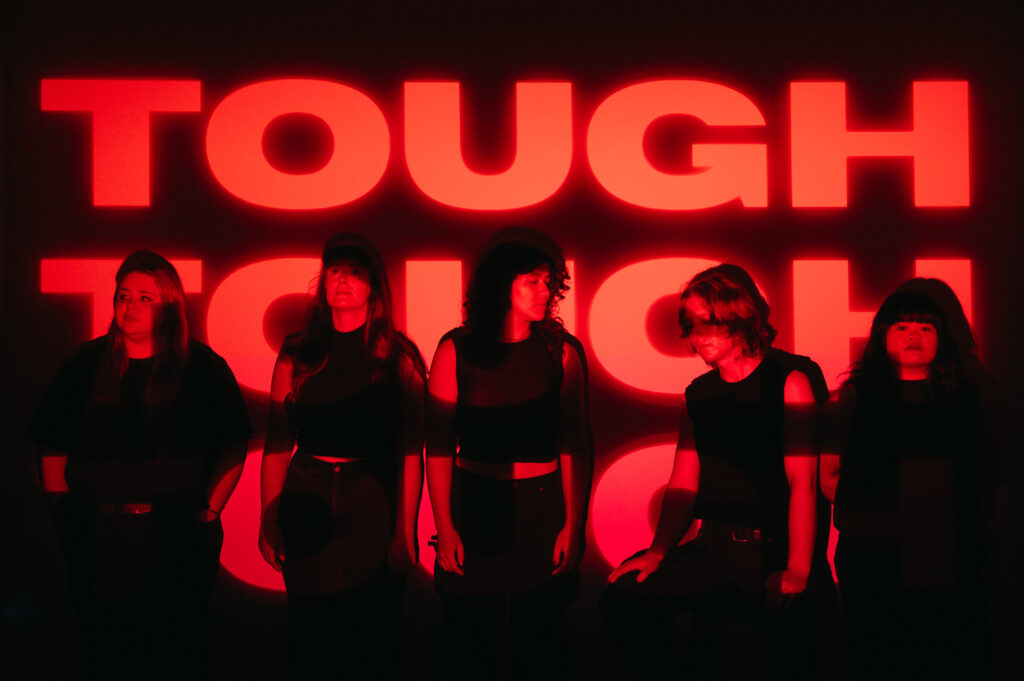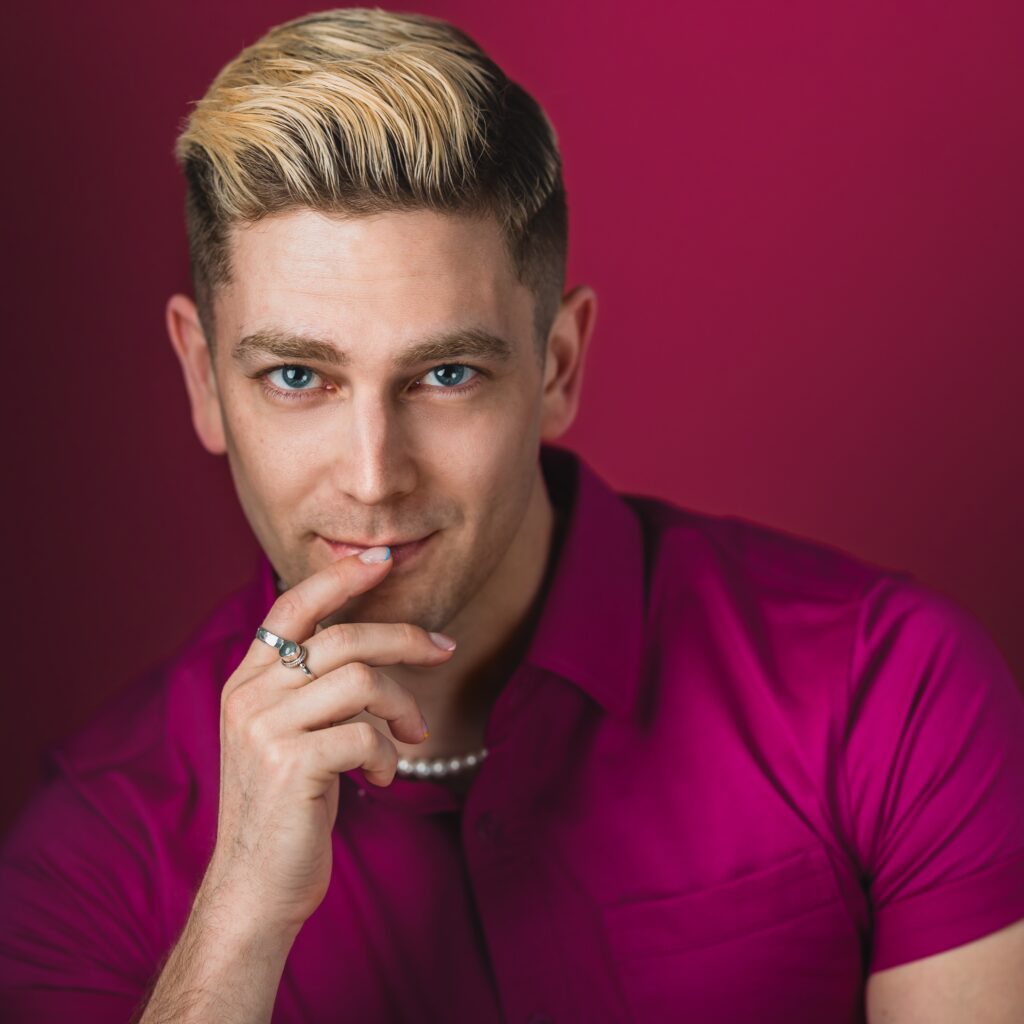What is a Tough Guy?

There’s a story behind every production you see onstage, from the script’s inspiration to the Artists involved, and more!
Tough Guy, by Hayley Moorhouse, kicks off our 2025/26 Fringe Theatre Season. We chatted with director and choreographer, Brett Dahl, about the creative process behind Tough Guy and what it means to endure.
If you had to describe Tough Guy in one sentence, what would it be?
Brett: Tough Guy is an embodiment of the tenacity of queer joy. Of survival.
Can you tell me a bit about your role in this production?
Brett: I’m directing and choreographing Tough Guy, and I’ve been involved since the very beginning. I had directed Hayley, the playwright, in a project when I was studying at the U of A doing my Masters and Hayley was like, “Hey, you’re gay. We get along.” So, Hayley asked me to direct the first workshop of it, and I didn’t totally mess it up and have kind of been around throughout each iteration of the script.
Before we began rehearsals, I’ve helped Hayley in facilitating the hiring of different artists, our designers, stage manager and technicians, and then also casting the production and sort of putting forth the cohesive vision – bringing all the different design elements together. Then, throughout rehearsals, I’m sort of making sure that the lighting design is speaking to the sound design and that the performances are matching what the text is looking for.
And Tough Guy jumps around between time and space in some interesting ways, and there are physical needs for the show that I get to focus on as a choreographer. There are moments with the characters dancing late at night in a club and there’s some boxing in it – we have a boxing bag hanging from the ceiling, which will be really exciting to play with.
Theatre is a really unique medium for storytelling and has a lot of potential for creative direction, what is your creative process in bringing a script to life?
Brett: Theatre can’t really do realism the way film can, so I’m really drawn to what symbols, images, and deeper meaning are evoked in a text, and finding ways to stage that. I’m always looking to bring more than just the literal on stage. I work a lot with images and the body as an image on stage, and that trickles into why I’m interested in movement as a form of expression as well.
There’s also the practical elements, like with Tough Guy, the play kind of jumps around in time, they’re in a queer dance club at once moment and in a garage the next. And at times these two realities blur. It’s been interesting working with our lighting, sound, and video designers on this duality; how we can create these two realities, this non-literal sense of space and time.
How did you try to creatively strike a balance between grief and celebration while working on Tough Guy?
Brett: I think you need the darkness to see the light and also the inverse of that. If you’re doing a tragedy and only going darker and darker and darker, I think the audience doesn’t really see how dark it is, unless you have the contrast of the light. The play shows a time when they were at peak joy at a New Year’s Eve party, and now, after the shooting, there’s a darkness that they’re in, and there’s moments that joy still bubbles up, but it’s like a short spark that can’t light, which is almost a tragedy in itself. They laugh, but then it dies, and there’s a silence that follows. I’m so excited to explore those moments. Hayley has done an incredible job of finding idiosyncratic and universal moments of grief.

Director & Choreographer
Healing can look different for everyone, it’s not always linear, and it is certainly complicated by ongoing threats of violence. What role does healing play in the story of Tough Guy?
Brett: I think all the characters in the play are trying to shut down, hide from, or escape their grief, which only feeds that emotion. Fuels their fear. One of the main characters, Quinn, is trying to be ‘Tough’, and in some sense, instead of processing their emotions they are just burying them, like a pot that’s about to boil over. Other characters pour energy into other things that distract from the trauma/healing, but trauma lives in your body, it lives in your muscle memory, it can’t be locked out of your brain. The more you resist the more it persists.
I think that’s part of what Tough Guy is exploring, is how these characters can move through this pain and find outlets so they don’t have to stifle it down and compartmentalize their feelings into a little box that will only fester and ferment.
Tough Guy is also interesting in that healing is happening collectively and simultaneously, how do you think Tough Guy explores the possibilities and complexities of community healing?
Brett: The characters are all trying to individually pursue what they think is best for their healing. Emerson is trying to document this grief and make a film, Ella turns to activism, taking care and mothering others; but these are still a deflection, and they are grieving individually – almost selfishly. What they learn is to meet and accept each other where they’re at in their healing and their faults, instead of imposing their idea of healing onto everyone else.
Hayley’s done some really amazing writing in moments of people failing in the pursuit of their healing. There’s this really great scene where a flickering light bulb goes out and two characters are left in the dark and they realize “oh, it’s just us in this room and we’re all we have”. It takes getting to rock bottom to realize how alone they are without each other.
There is something particularly resilient about the queer community, how does Tough Guy explore the queer community’s capacity for strength and endurance?
Brett: Our culture is about visibility and the strength and resilience of people who are brave enough to be visibly queer, to share queer stories, to live queer lives. I think it goes back to that interrogation of what being “tough” is and what enduring is. Activism doesn’t have to be intense, it doesn’t have to be hard, it can be soft, it can be the teenagers on Whyte Ave standing and dancing and counter–protesting without violence, it can be joyous.
This requires bravery and that kind of bravery is the reason that we are still able to fight and that we have some rights. When you realize what can be taken away, you realize what you have to fight for. It’s not an easy fight, and the characters in this play are just kind of at the beginning. They’re still so young, and what they’re dealing with is so hard and so personal, and I feel like it’s the foundation for them to have much more power as activists in their life after this play.
A story about the aftermath of a mass shooting in the queer community is already very nuanced. How does adding the issue of representation deepen or complicate the conversation being had through this play?
Brett: In Tough Guy, not everyone agrees with the making of the documentary, it’s contentious. The documentarian, Emerson, feels like it’s their way as an artist to contribute, and even though sometimes their approach is flawed, I think as artists, in the wake of a tragedy, we often want to contribute artistically. Hayley’s done a really good job of tackling the subject matter, without being didactic or precious about it. Emersons flawed approach brings up questions like, how do we reckon with tragedy? How do we document this? What is our responsibility and relationship, as artists, to tragedy, whether personal or global?
What do you hope audiences take away from seeing the show?
Brett: I think there’s a big lesson in human connection and the importance of that and how fast we can lose it. I really feel that the characters are trying to shut each other out in order to heal, but I think you need to embrace each other to heal and process.
When queer people live in a state of fear growing up that who you touch is wrong, or how you touch is wrong, that manifests itself throughout your lifetime and to be attacked in the place that is your escape, the fear of who you are and what you are creates these silos around you that don’t need to be there. So, I just hope people feel that tenderness for human connection that we need at the end of the day

Join us for this simultaneous excavation of a tragedy and a celebration of the tenacity of queer joy. Tough Guy plays October 28 – November 8, in our Backstage Theatre with tickets for only $26!